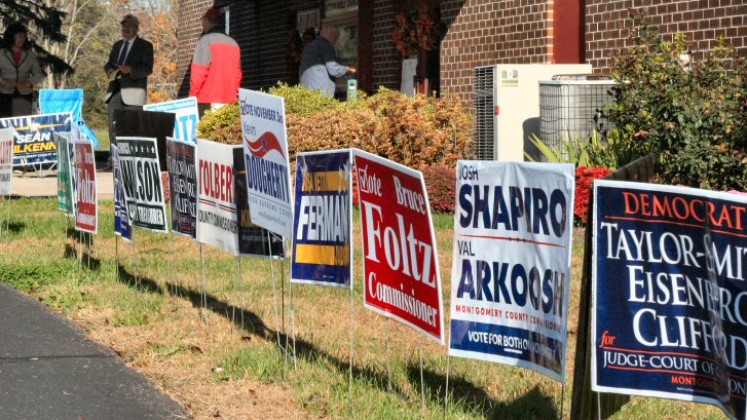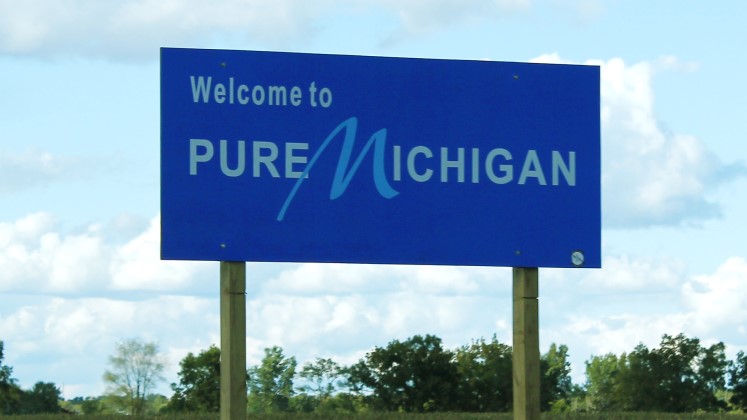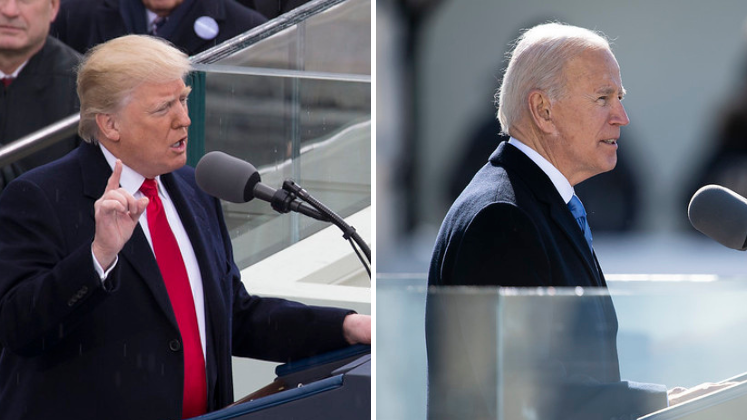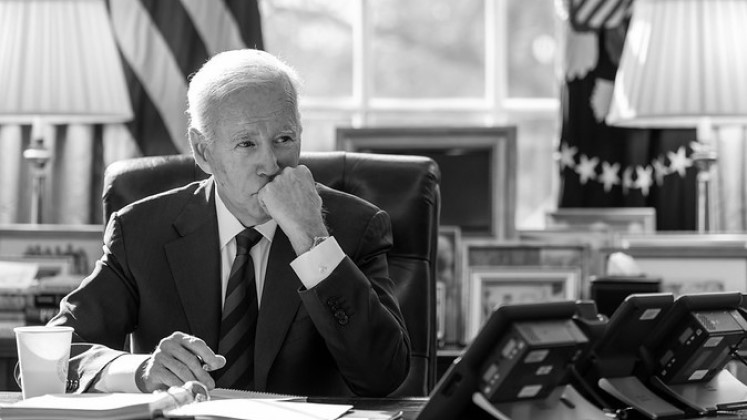 As of this writing, there are only two women in the race for President. Republican Nikki Haley is former governor of South Carolina and was UN Ambassador in the Trump administration. Democrat Marianne Williamson is a writer and running against incumbent President Joe Biden. Samantha Pettey writes that while Williamson likely has no chance of success, Haley might be able to win the nomination if Donald Trump’s legal entanglements imperil his candidacy.
As of this writing, there are only two women in the race for President. Republican Nikki Haley is former governor of South Carolina and was UN Ambassador in the Trump administration. Democrat Marianne Williamson is a writer and running against incumbent President Joe Biden. Samantha Pettey writes that while Williamson likely has no chance of success, Haley might be able to win the nomination if Donald Trump’s legal entanglements imperil his candidacy.
- ‘This article is part of ‘The 2024 Elections’ series curated by Peter Finn (Kingston University). Ahead of the 2024 election, this series is exploring US elections at the state and national level. If you are interested in contributing to the series, contact Peter Finn (p.finn@kingston.ac.uk).’
Scanning the major headlines, analysis, and stories of most national news outlets in the US might lead one to conclude that the 2024 general election is inevitably a race between two candidates — President Joe Biden and former President Donald Trump. This dominant narrative is likely due in large part to both candidates’ polling numbers. According to FiveThirtyEight, Biden’s primary candidacy has the support of about 65 percent of likely Democratic primary voters. Trump’s Republican support – at closer to 55 percent support – might actually be seen as even more dominant considering his nine challengers in the Republican primary relative to Biden’s two in the Democratic primary.
However, there are other presidential candidates and they continue to remain in the race, while also campaigning far more vigorously than the front runners. Why they stay on despite their struggles is an interesting question. One explanation is the candidates are waiting for the possibility that Trump’s – or even Biden’s – legal challenges end or seriously impair their campaigns. Another is that both race leaders might eventually struggle because of their low overall approval levels. According to FiveThirtyEight’s aggregate tracker of Biden’s approval, 41.1 percent of Americans approve of the President while 54 percent disapprove. Similarly, Donald Trump’s current approval is around 41 percent favorable and 55 percent unfavorable. In fact, a majority of Americans tell pollsters they don’t want Joe Biden or Donald Trump running again. The motivations for each challenger campaign likely vary, but there is competing evidence in the polls that suggest there is room for a new candidate to emerge successfully.
I’m going to narrow my focus to the most competitive woman candidate in the race: former South Carolina Governor and US Ambassador to the United Nations Nikki Haley. Self-help author Marianne Williamson remains in the Democratic race, yet few see her candidacy as serious and the Biden’s campaign seems to be treating the race as if it is a general election between himself and Trump. I explore Haley’s candidacy, looking at her strengths, qualifications, and performance in the debates within the context of research on women in politics.
Nikki Haley and the Republican primary debates
Nikki Haley was governor of South Carolina from 2011-2017 and most recently on her political resume, the United Nations Ambassador from 2017-2018. Haley is a woman of many firsts, an important theme women in politics scholarship emphasizes. She was the first Indian-American to hold any position of elected office in South Carolina, the youngest and first woman governor in the state while also being the first woman of color governor in the country. Finally, she was also the first Indian-American to serve in a presidential cabinet. Haley is a very experienced presidential candidate given her previous role as governor, and her international experience while serving as UN ambassador. I’d argue her specific experience and knowledge in foreign affairs has led to an increasing favorability of her as a candidate over time and sets her apart from the crowded primary field. Recently, the debate stage has given Haley the opportunity to note her experience in foreign affairs while pointing out her primary rivals are lacking in this area.
Nikki Haley, by some measures, gained the most support of any candidate after her first debate performance on August 23rd. In a panel analysis using the same group of potential Republican primary voters before and after the debate, Ipsos finds 29 percent of debate watchers believe Ron DeSantis performed the best followed by 26 percent saying Vivek Ramaswamy and 15 percent saying Nikki Haley performed the best. Yet, the pre/post analysis by FiveThirtyEight, is arguably a better and more nuanced way to examine this data. They measure the difference in share of voters considering voting for candidates before and after the debate. Haley saw a 17-point jump in support going from 30 percent pre-debate and 47 percent post-debate. DeSantis saw a 5-point increase from 63 percent to 67.5 percent and Trump, who did not attend the debate, lost about 5 points going from 66 percent to 61 percent. Given national polling averages show DeSantis at 15 percent support, the second highest candidate after Trump (54.7 percent support), Haley’s 17-point jump is a different way to examine this data. Polls are likely to find that DeSantis ‘won’ a debate given he has the second highest support already.

“Nikki Haley” (CC BY-SA 2.0) by Gage Skidmore
Recent research on the impact presidential debates have on voter’s attitudes find that information gained is fairly minimal, despite the conventional wisdom that assumes debates matter for vote choice. Further, these first few Republican primary debates are less likely to matter given the front-runner for the party, Trump, is not opting in and has little incentive to do so. In a study examining the impact presidential debates have on voters, research finds that modern debates are more likely to change the minds of voters from the post-election coverage or when the audience laughs, or claps which might lead to “meme-worthy” moments. Nonetheless, the second debate on September 27th seems to have given Haley a “meme-able” moment when she told Ramaswamy “Honestly, every time I hear you, I feel a little bit dumber”. While the second debate seems to lack memorable moments, the after-debate coverage has nonetheless noted the exchange between Haley and Ramaswamy.
Republican candidates and stereotypes
Thinking about a woman in the Republican race in a way we can compare to previous research is trickier ground to cover well, since a female Republican has never held the party’s nomination. Former Secretary of State Hilary Clinton was the first woman of a major party to be nominated in 2016, but for the Democratic Party, and former Alaska Governor, Sarah Palin, was a Republican but the running mate in 2008. Palin was fairly popular amongst Republicans as the Vice Presidential nominee but her popularity in the party waned overtime.
Studying Haley’s debate performance is important given what we know about how voters respond to women candidates—especially woman candidates in the Republican Party. While research is limited to Congress, given the small number of women who have run for President, research finds that Republican women have more difficulty overcoming stereotypes about what candidates “should look like” than Democratic women. Research finds that children associate politics with being male dominated because it still is, especially at the executive level. Further, Republican voters have more traditional gender views of the world which places women, and specifically Nikki Haley, in a tough position skirting a line that says `I am a woman who is capable of leading the country’ while trying to not break from traditional views of women that could hurt a candidacy with the base. Women Republican candidates need to emphasize toughness and intelligence while also looking and acting more traditionally feminine.
Given all this, the fact that Haley is the only Republican woman in the field is not surprising. Further, I’d argue, like research in the field finds, she is also a higher quality candidate than her male contenders. Women, once they emerge as serious candidates, are usually more qualified for the position than their male counterparts. Haley is a former governor, like many who are also running, but she is also the only candidate, aside from Trump, with any foreign policy experience— an area the President of the United States plays a large and active role. Haley brings up this experience in debates and uses this to her advantage. She is reminding voters on the campaign trail and during debates that she is qualified has the necessary experience.
Final thoughts on the direction of the race
While research suggests Trump and Biden have high name recognition which can help them secure their respective party nominations, competing historical analysis from FiveThirtyEight suggests it is too soon to know. Given the early nature of these primary polls, Trump’s legal standing, and Haley’s gradual rise in favorability, this primary is not inevitable or over. In a possible Haley and Biden general election, one interesting thought to consider would be how the public might respond to an older white male Democrat and a younger woman of color Republican.
Congressional research with coauthors find Democratic women are much more likely to dislike women Republicans than Democratic men. Yet, the ground to be gained in a Presidential election win is amongst Independents and moderates, not the partisans. Haley may have an upper hand given Biden’s lower approval with the general public and Haley’s more moderate positions on issues like abortion and Social Security and Medicare.
The big question to consider is whether or not candidates will begin to drop out of the race and how this might affect Haley’s bid for Presidency. Right now, the field is too crowded, and Trump still has a lot of national media attention and is leading more and more in the polls. There might be some instance where Haley gains ground as other candidates winnow, but as the race stands, it is unlikely she is in a position to pass Trump in support. Haley is gaining support amongst likely voters in New Hampshire and Iowa but still falls behind Trump and DeSantis. Yet, Haley is viewed by some donors as their best hope to defeat Trump but still only has two endorsements from party leaders nationwide. At this point, we will all have to wait and see while the campaign and the debates continue as if the Republican primary is actually competitive.
Please read our comments policy before commenting.
Note: This article gives the views of the author, and not the position of USAPP – American Politics and Policy, nor the London School of Economics.
Shortened URL for this post: https://bit.ly/46VHxdX






